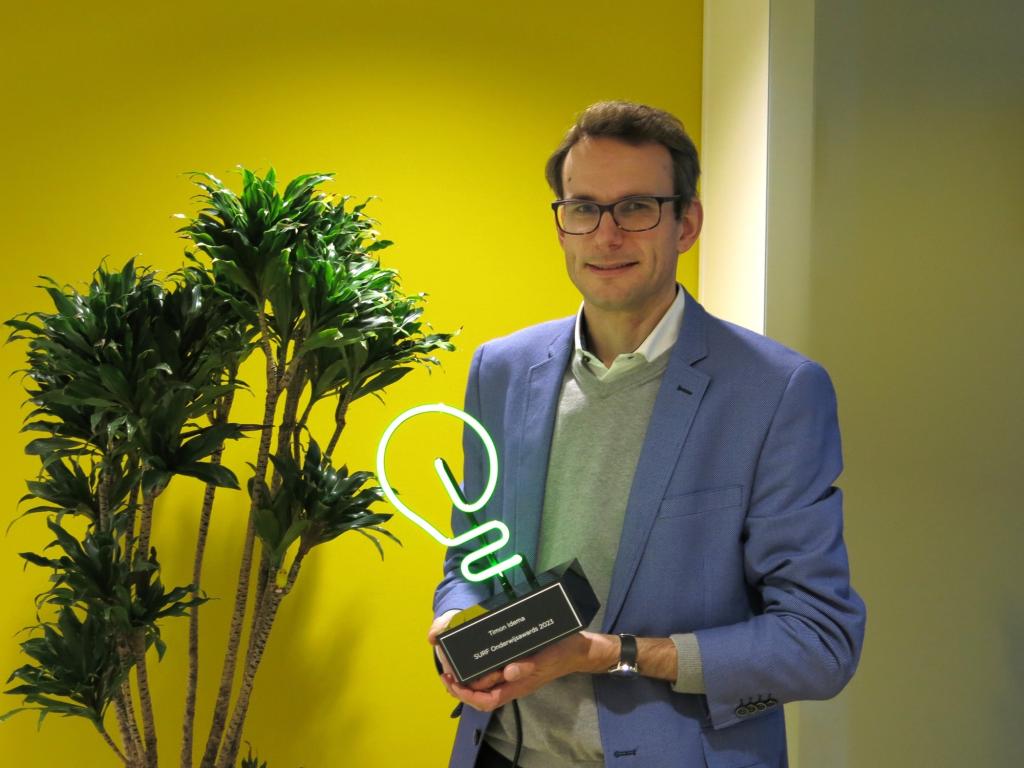Timon Idema helped develop a service at TU Delft so that anyone can publish their own interactive and open textbooks. He received a SURF Education Award for this work.
English only
“When I came to TU Delft, the Nanobiology programme was just starting. I was asked to teach a Physics course together with another colleague and like many of our other colleagues, we started making our own course, developing things from scratch. Many people started writing their own notes and at one point I had quite a collection of notes. Then I ran into Michiel de Jong from the TU Delft Library, who was trying to get people to put stuff out as open textbooks at that time. I had this collection of notes and thought why not? That’s how I came about making my first textbook.
It was a PDF and printed book, but then there was an opportunity to apply for funding to further develop these things. I knew a lot of my colleagues had also made material specifically for Nanobiology, so we applied for funding from SURF and we were lucky enough to get a grant to do this. That got the ball rolling, but while doing that, I realised there was a need for being able to do this more collaboratively on the side of the teachers and more interactively on the side of the students. I saw a lot of students who did not actually have printed books, but they just had a PDF which is not so nice for reading on your phone or your laptop.
So I applied for a TU Delft Education Fellowship to explore and develop this. The first thing I did was look around at what people are already doing. Very quickly, we chose the Jupyter books platform because it had a lot of the things that people said they would like. I had all my materials written in Latex, which is not fully compatible with this open textbook format. So I wrote a programme that can translate my Latex notes one on one into this new format. We recently opened an interactive textbooks website with FAQs, manuals, examples, and templates of how to do this. There’s currently one demonstration book available, four books that have been published, and there are five more that are going to be published very soon.
‘Students are obliged to buy books, but the books are expensive’
We’re moving to open on many fronts for scientific publications and at some point, all of them will be open. I think education, too, will have to be open. Students are obliged to buy books, which is fine if the books are good and reasonably priced. But if the books are expensive, then it is not so fine, especially for students from disadvantaged socioeconomic backgrounds. Plus the people who benefit from it are not the universities, not the people who actually do the work, but it’s the publishers who benefit.
But more than that, on a more practical note, once you’ve printed a textbook, you can’t change it. And many things, especially in the field that I teach, change very rapidly. So you want to keep things up to date, which is much easier to do with this online format than with a static textbook. The online format is a bit more user friendly and it’s quite easy to build on other people’s work. I often use the example of Wikipedia. You can quite easily change it and adapt it as long as you give proper credit. This is all possible within the open textbook framework without having to create everything from scratch.
I recently received a SURF Education Award in recognition of this work. I know there were a lot of nominations and I’m sure that I was not the only good one. But part of the reason I think this project has been successful is because it’s not just me wanting everyone to do it. We’re already working with people in Mathematics and Civil Engineering to publish their materials and there are people at the faculties of Aerospace; Technology, Policy & Management; and Industrial Design that are interested. There are a lot of people that want to do something like this. Now we’re getting together and we have the support of the Library and TU Delft OPEN Publishing so I think this will grow to be TU Delft wide. I hope this becomes the norm and I think that it has further potential to grow.”
Want to be featured in Humans of TU Delft? Or do you know someone with a good story to tell? Send us an e-mail at humansoftudelft@gmail.com
Heather Montague / Freelance writer



Comments are closed.